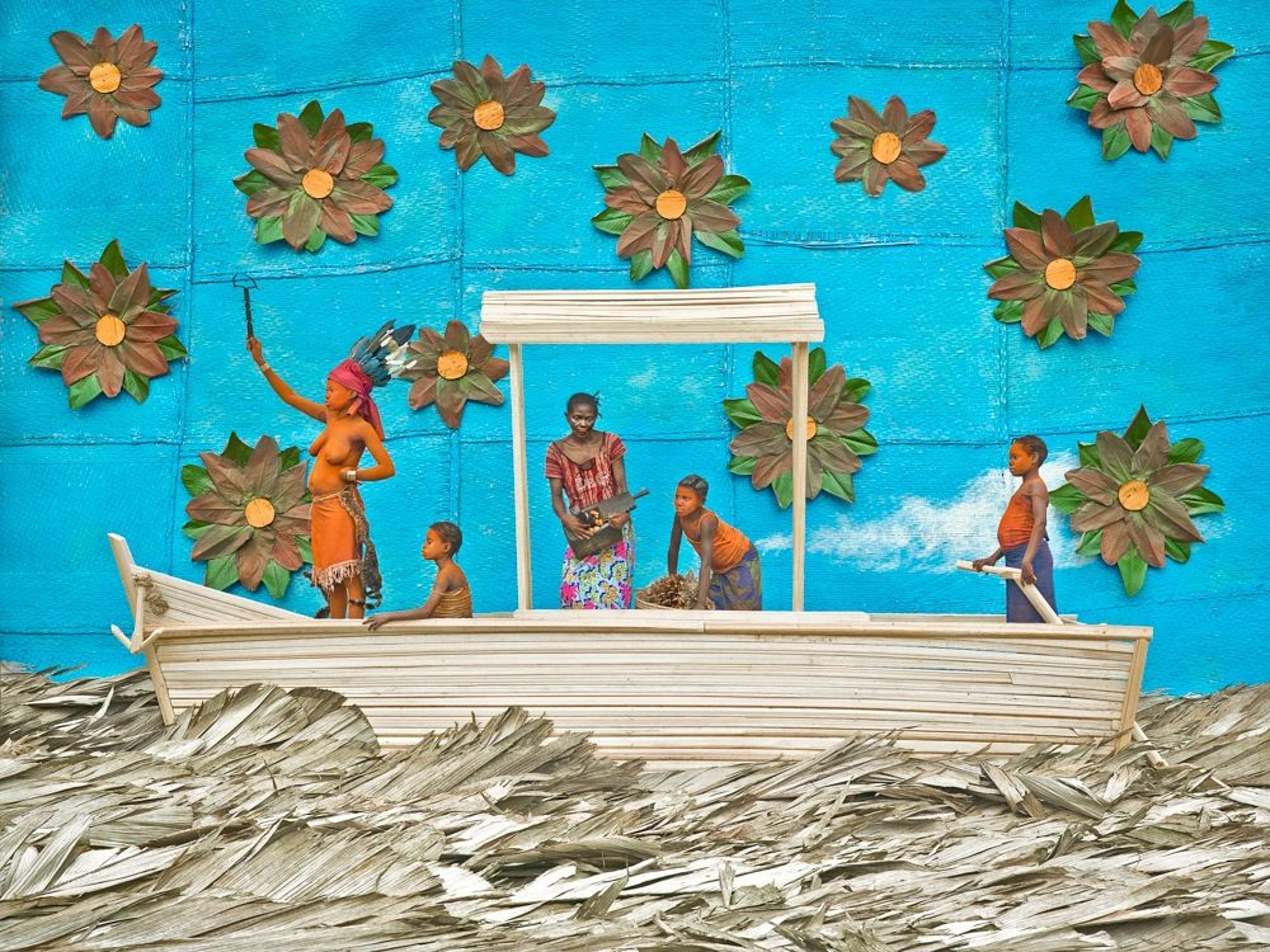Walé Asongwaka, educated walé. Song: Walé stand! I stand, be seated! I sit, Walé I walk with chair of white people and chiefs, I Walé of school, I walk with book in hand. « Ensansa : Walé Njémálá ! nsêmálá, Nkîkìsa ! nsôkìsa, Walé njôkàndé la kíti yéndélé l’énkònji, Walé bó kàlàhi, njôkàndé la búku ndîkàta ». © Patrick Willocq
Walé Asongwaka, sentenced to jail. Song: I do not answer calls, mamas take me, jail to main town. « Ensansa : mpúàmbolé lobélá, bâmâ bôntombi, bòlóko nd’ímònga ». © Patrick Willocq
Walé Epanza Makita, honor, prestige and power. Song: I not answer calls, I answer on room, boar sleeping. « Ensansa : Mpúàmbolé lòbélà, nyàmbòle ndé lobùlú, lôlálé nsòmbo ». © Patrick Willocq
The Arch of Walé Oyombé. Song: Papas see us, I come land boat, with assistants, feathers, this assistant enters hut prepare food, mum enters hut prepare palm. « Ensansa : bâpápá lôlende njôyé l’isúà y’okili, nko lá basómí, mí bíòto, iné isómí áyôtùà nd’ôtumbá yôndámbéla bìòmbo, mâ ásôtua nd’ôtumbá yôndámbéla bankondo ». © Patrick Willocq
Walé Lokito, unfair sharing. Song: Papas, review share give your sisters. « Ensansa : bôpápá lôsóló bàbóndo bâpâ nyó bakombe ». © Patrick Willocq
Walé Lokito and her belongings. Song: I leave this room, this room I look for belongings. « Ensansa : lòné bóbùlú njôla, lòné bóbùlú njôlùka bìòmba ». © Patrick Willocq
Walé Oymobé, bored and alone. Song: Drums hit Itipo of Bobenga, mamas go with hoe on shoulders. « Ensansa : lokúkú lókula Itipo y’ Obenga, bâmâ bâyôlèké là nyóngo nd’âpèke ». © Patrick Willocq
Walé Mpia and her mundele. Song: Rival Walé, do not kill each other, Mpia married white man, Mpia found husband, I married Patrick. « Ensansa : Bakalé biàlé bòpálá yôyàbòma, Ipaya ábálé bòndélé, Ipaya ábátá bôme, emí mbálé Patriki » © Patrick Willocq
Lokito, hunter Walé. Song: Father is great hunter, killed wild boar and antelope, Walé these are songs of invitation. « Ensansa : pápá ayàlí bòbènga bònéne, bôlìáké nsombo la mbuli, mbélá îko biàlé ». © Patrick Willocq
Epanza Makita, batwalé. Song: Part animal, part bird, I face upside down, bat the great. « Ensansa : Bokéngé nyama, bokéngé mpùlú, n’sùname ng’ósunámá, bònkómo w’éngolo » © Patrick Willocq
Walé Asongwaka takes off. Song: Plane you're white, Walé goes on hanging, from the fence. « Ensansa : Avìo êkînó bèndélé, walé áyôlí ndé bókòma, w’ilàka ». © Patrick Willocq
Walé Oyombé, Nkumu. Song: Papas tipoy put me in, me I go into eloba forest, me I come, all assistants with rifles on shoulders. « Ensansa : bôpápá boutíka nd’ípoy, mí nyúme nd’ókonda w’élóba, mí ngóyé, basómi báyânkùmá l’´ndóki nd’âpèke ». © Patrick Willocq
Walé Mpia and Oyombé, basketry veawing. The Walé ritual imposes various taboos on the young mother, such as going to the fields, preparing or serving food, leaving her plenty of time to pamper herself and her child. The only authorized work is traditional basketry weaving. © Patrick Willocq
Walé Oyombé, polygamy. The prestige and power of a Walé derives from the respect she earns by observing the sex taboo during the period of her seclusion (2 to 5 years), despite her attractiveness and youth. But a direct consequence of the Walé ritual is to encourage polygamy, socially accepted by the community. © Patrick Willocq
Walé Asongwaka, finally free. Immediately after the seclusion-ending festival, Walé Asongwaka (21 years old, 3 years in seclusion, mother of Bola) returned to her husband’s hut. The next day she and her child have flaunted their best set of clothes to the whole community. © Patrick Willocq
 For this project, I dove deeply into an initiation ritual of the Ekonda pygmies in the Democratic Republic of Congo. The Ekondas believe that the most important moment in the life of a woman is the birth of her first child.
For this project, I dove deeply into an initiation ritual of the Ekonda pygmies in the Democratic Republic of Congo. The Ekondas believe that the most important moment in the life of a woman is the birth of her first child.





